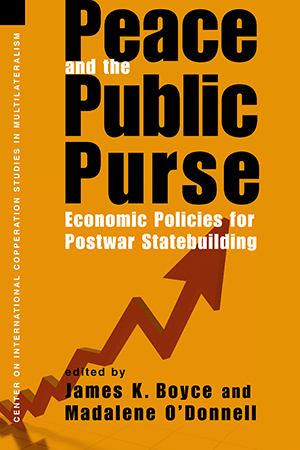James K. Boyce and Madalene O'Donnell, editors
In the aftermath of violent conflict, how do the economic challenges of statebuilding intersect with the political challenges of peacebuilding? How can the international community help lay the fiscal foundations for a sustainable state and a durable peace? Peace and the Public Purse examines these questions, lifting the curtain that often has separated economic policy from peace implementation.
Drawing on recent experiences in Afghanistan, Bosnia, Cambodia, Timor-Leste, Guatemala, Palestine, and Uganda, the authors bring to life a key dimension of how both peace and states are built.
James K. Boyce is professor of economics at the University of Massachusetts, Amherst, where he directs the program on peacebuilding at the Political Economy Research Institute. He is author of Investing in Peace: Aid and Conditionality After Civil War and editor of Economic Policy for Building Peace: The Lessons of El Salvador. Madalene O'Donnell is on the staff of the UN Department of Peacekeeping Operations. Previously, she coordinated the program on postwar statebuilding at New York University's Center on International Cooperation; and she has also worked on public-sector reform at the World Bank and served as anticorruption adviser at the US Agency for International Development.
"An important contribution on the topic of public finance, state building, and peace building.... Extremely valuable."—Anke Hoeffler, Economic Development and Cultural Change
"A key issue of our time is how to ensure that states emerging from conflict are equipped with the foundations on which to build a durable peace. The incisive and penetrating analysis in Peace and the Public Purse provides a valuable contribution to this endeavor."—Alvaro de Soto, UN Special Coordinator for the Middle East Peace Process
"A key informant once said, 'Follow the money.' This is sage advice, not only for unravelling scandals, but also as the authors demonstrate in this book for understanding successes and failures in peacebuilding."—Stephen John Stedman, Stanford University
"Fiscal policy is critical to sustaining peace, as well as development. Peace and the Public Purse covers this vital issue comprehensively, insightfully, and realistically. It is essential reading for anyone working on postconflict societies."—Frances Stewart, Oxford University
"Too often policymakers neglect the economic dimensions of postconflict peacebuilding. This thoughtful and timely book shows why that is a serious mistake and what can and should be done about it."—Gareth Evans, International Crisis Group
"This practical and insightful book demonstrates why public finance issues should be of concern not only to economists, but to all policymakers working with fragile postconflict societies."—Sarah Cliffe, Fragile States Group, World Bank






